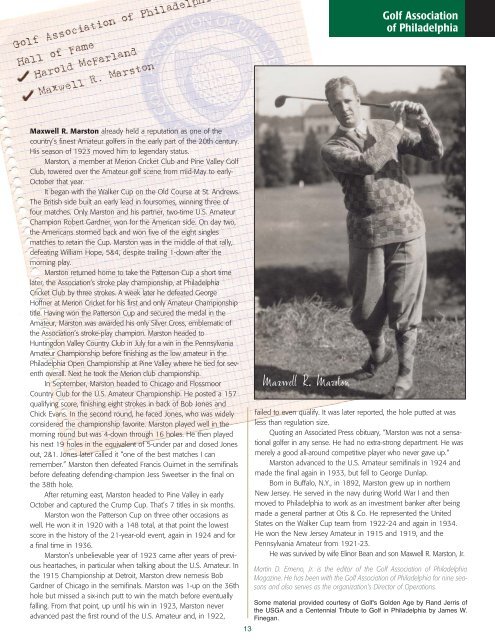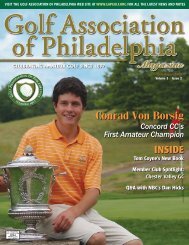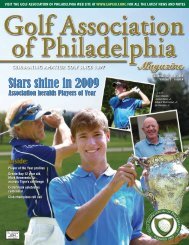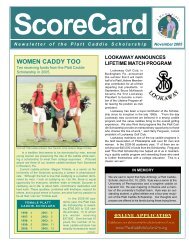2009 Hall of Fame Class - The Golf Association of Philadelphia
2009 Hall of Fame Class - The Golf Association of Philadelphia
2009 Hall of Fame Class - The Golf Association of Philadelphia
Create successful ePaper yourself
Turn your PDF publications into a flip-book with our unique Google optimized e-Paper software.
Maxwell R. Marston already held a reputation as one <strong>of</strong> the<br />
country’s finest Amateur golfers in the early part <strong>of</strong> the 20th century.<br />
His season <strong>of</strong> 1923 moved him to legendary status.<br />
Marston, a member at Merion Cricket Club and Pine Valley <strong>Golf</strong><br />
Club, towered over the Amateur golf scene from mid-May to early-<br />
October that year.<br />
It began with the Walker Cup on the Old Course at St. Andrews.<br />
<strong>The</strong> British side built an early lead in foursomes, winning three <strong>of</strong><br />
four matches. Only Marston and his partner, two-time U.S. Amateur<br />
Champion Robert Gardner, won for the American side. On day two,<br />
the Americans stormed back and won five <strong>of</strong> the eight singles<br />
matches to retain the Cup. Marston was in the middle <strong>of</strong> that rally,<br />
defeating William Hope, 5&4, despite trailing 1-down after the<br />
morning play.<br />
Marston returned home to take the Patterson Cup a short time<br />
later, the <strong>Association</strong>’s stroke play championship, at <strong>Philadelphia</strong><br />
Cricket Club by three strokes. A week later he defeated George<br />
H<strong>of</strong>fner at Merion Cricket for his first and only Amateur Championship<br />
title. Having won the Patterson Cup and secured the medal in the<br />
Amateur, Marston was awarded his only Silver Cross, emblematic <strong>of</strong><br />
the <strong>Association</strong>’s stroke-play champion. Marston headed to<br />
Huntingdon Valley Country Club in July for a win in the Pennsylvania<br />
Amateur Championship before finishing as the low amateur in the<br />
<strong>Philadelphia</strong> Open Championship at Pine Valley where he tied for seventh<br />
overall. Next he took the Merion club championship.<br />
In September, Marston headed to Chicago and Flossmoor<br />
Country Club for the U.S. Amateur Championship. He posted a 157<br />
qualifying score, finishing eight strokes in back <strong>of</strong> Bob Jones and<br />
Chick Evans. In the second round, he faced Jones, who was widely<br />
considered the championship favorite. Marston played well in the<br />
morning round but was 4-down through 16 holes. He then played<br />
his next 19 holes in the equivalent <strong>of</strong> 5-under par and closed Jones<br />
out, 2&1. Jones later called it “one <strong>of</strong> the best matches I can<br />
remember.” Marston then defeated Francis Ouimet in the semifinals<br />
before defeating defending-champion Jess Sweetser in the final on<br />
the 38th hole.<br />
After returning east, Marston headed to Pine Valley in early<br />
October and captured the Crump Cup. That’s 7 titles in six months.<br />
Marston won the Patterson Cup on three other occasions as<br />
well. He won it in 1920 with a 148 total, at that point the lowest<br />
score in the history <strong>of</strong> the 21-year-old event, again in 1924 and for<br />
a final time in 1936.<br />
Marston’s unbelievable year <strong>of</strong> 1923 came after years <strong>of</strong> previous<br />
heartaches, in particular when talking about the U.S. Amateur. In<br />
the 1915 Championship at Detroit, Marston drew nemesis Bob<br />
Gardner <strong>of</strong> Chicago in the semifinals. Marston was 1-up on the 36th<br />
hole but missed a six-inch putt to win the match before eventually<br />
falling. From that point, up until his win in 1923, Marston never<br />
advanced past the first round <strong>of</strong> the U.S. Amateur and, in 1922,<br />
13<br />
Maxwell R. Marston<br />
<strong>Golf</strong> <strong>Association</strong><br />
<strong>of</strong> <strong>Philadelphia</strong><br />
failed to even qualify. It was later reported, the hole putted at was<br />
less than regulation size.<br />
Quoting an Associated Press obituary, “Marston was not a sensational<br />
golfer in any sense. He had no extra-strong department. He was<br />
merely a good all-around competitive player who never gave up.“<br />
Marston advanced to the U.S. Amateur semifinals in 1924 and<br />
made the final again in 1933, but fell to George Dunlap.<br />
Born in Buffalo, N.Y., in 1892, Marston grew up in northern<br />
New Jersey. He served in the navy during World War I and then<br />
moved to <strong>Philadelphia</strong> to work as an investment banker after being<br />
made a general partner at Otis & Co. He represented the United<br />
States on the Walker Cup team from 1922-24 and again in 1934.<br />
He won the New Jersey Amateur in 1915 and 1919, and the<br />
Pennsylvania Amateur from 1921-23.<br />
He was survived by wife Elinor Bean and son Maxwell R. Marston, Jr.<br />
Martin D. Emeno, Jr. is the editor <strong>of</strong> the <strong>Golf</strong> <strong>Association</strong> <strong>of</strong> <strong>Philadelphia</strong><br />
Magazine. He has been with the <strong>Golf</strong> <strong>Association</strong> <strong>of</strong> <strong>Philadelphia</strong> for nine seasons<br />
and also serves as the organization’s Director <strong>of</strong> Operations.<br />
Some material provided courtesy <strong>of</strong> <strong>Golf</strong>'s Golden Age by Rand Jerris <strong>of</strong><br />
the USGA and a Centennial Tribute to <strong>Golf</strong> in <strong>Philadelphia</strong> by James W.<br />
Finegan.





